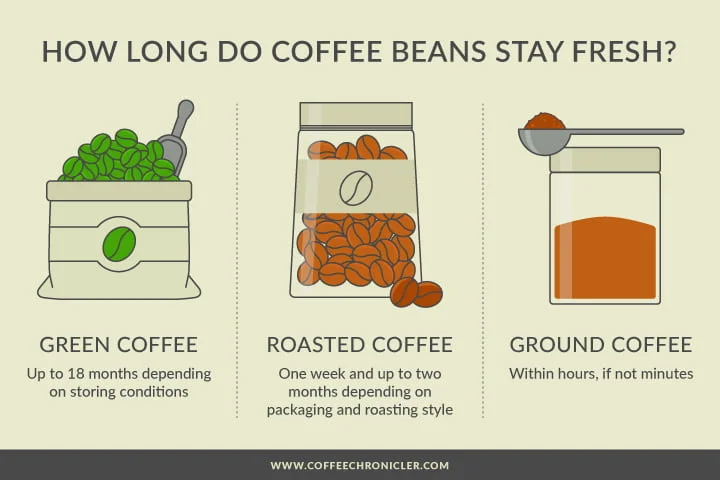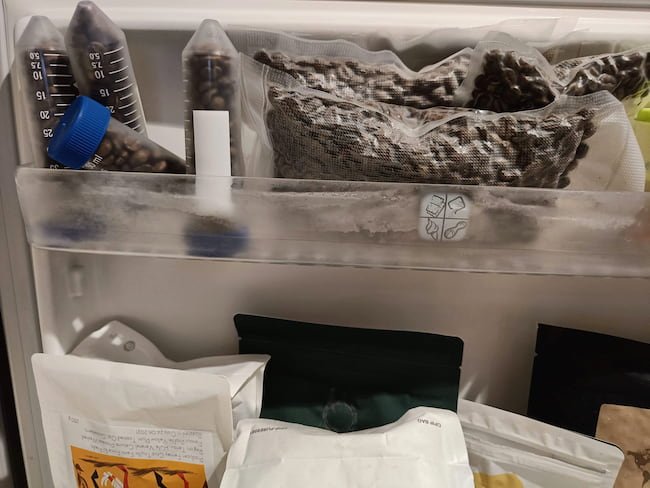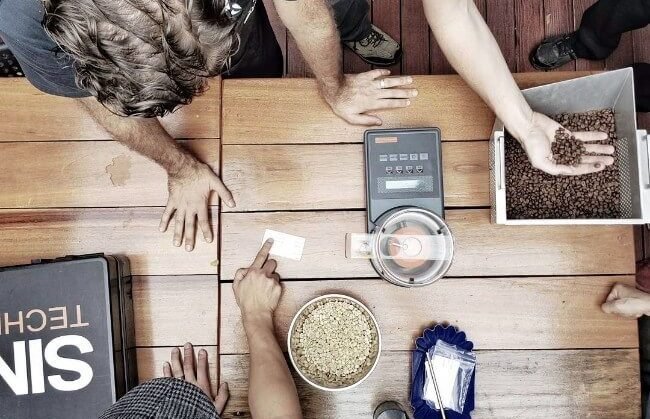Coffee freshness has become a controversial topic among coffee professionals. It used to be one of the few things we could all agree on, but this is no longer the case.
Personally, I have changed my opinion somewhat over the last couple of years.
There’s no doubt that freshness still matters. It’s just that the debate has become a lot more nuanced than it was previously.
In the following article, I’ll walk you through different scenarios so that you can brew the freshest (and most tasty) coffee at home.
How long do coffee beans stay fresh?
Most people never think about it, but coffee is an agricultural product. Even though you can store it for a while, eventually it will lose some of its inherent qualities.
Try to think about bread for a moment. You can store flour for an extended period without any noticeable loss in quality. Depending on the conditions, it should stay good for 1-2 years. However, once you bake it, the rate of deterioration increases rapidly. Freshly baked bread is only at its peak for 24 hours.
Would you consider eating a loaf of bread that was baked half a year ago? Probably not. In many ways, coffee is similar, although not quite as extreme a case as bread.
Here are some rules of thumb when it comes to coffee freshness:
- Green coffee: Will stay fresh for about 18 months, depending on the storing conditions, and how the coffee has been dried at the farm.
- Roasted coffee: Can stay fresh from one week and up to three months, depending on packaging and roasting style.
- Ground coffee: Whole beans will retain more volatile aromas. Grinding the coffee will make it lose its freshness within the first day. However, if you store the coffee in an airtight container, you can prolong the window of freshness.
Can coffee be too fresh?
When specialty coffee started out — just 15 years ago — one of the selling points was the idea of freshness. Back then, that was a rather novel idea.
Everybody was drinking supermarket coffee, and that stuff would often be sitting on the shelf for up to a year. Freshness was an easy way to stand out.
The maxim in specialty coffee thus became “the fresher, the better.”

This idea trained people to look for coffee that was roasted within just a few days. The prevailing belief was that after a de-gas period of 24-48 hours, where the beans would release carbon dioxide built up during the roast, the coffee would be at its peak flavor-wise.
Nordic light roasts and roast date
However, in recent years, a lot of roasters have started to claim that coffee can actually be “too fresh” and that their coffee needs additional resting time. I haven’t seen any actual science to back up this idea, but it seems to be getting traction in the home-brewing community.
This idea seems to be especially prevalent when it comes to ‘Nordic’ light roasts. These incredibly light roasts tend to be acidic and vegetal if they are brewed right after roasting.
When I first heard about this concept, frankly I thought it was BS. But now I have experienced a few instances, where really light roasts taste awful the first week, but really open after 3-4 weeks.
Some of these beans (especially really light Ethiopians) have even tasted exquisite several months later.
So when we talk about freshness, we need some nuance. We need to look at more than a roast date. We also need to consider the roasting style.
- Ultra light roasts: tend to peak 14-30 days post-roast
- Medium to dark roasts: At peak from 3-14 days after roast
We need to keep in mind that there are many variables in coffee; bean density, roasting style, and your brewing method.
What’s ‘too old’ and ‘too fresh’ will depend on all these things. For example, when it comes to espresso, you should move your time scale some days or even weeks. Freshly roasted coffee tends to create way too much crema.
How to keep coffee beans fresh at home
There is yet another aspect of freshness that we need to consider, and that is the packaging and storage of the beans post-roast.
If you roast some premium coffee and put in a brown bag, it’s going to lose its freshness fast.
However, if you take the same coffee and put it in a nitrogen flushed bag, it will stay fresh a lot longer. Oxygen is the enemy of coffee freshness, and preparing coffee this way extends the shelf life. Many of the best roasters use this technology when packaging coffee today. (This technique, is too expensive to use in a non-commercial setting.)
But remember! When you open the bag at home, you ruin the stable environment inside the coffee bag. The coffee should probably be consumed within ten days after opening.
How to keep coffee beans fresh at home
One of the best ways to store coffee at home is to keep it in the original packaging and squeeze out all the excess air. Then use a rubber band to make sure that the bag will stay compressed.
Does freezing coffee beans keep them fresh?
Yes, coffee can actually be frozen with excellent results. In certain situations, it’s actually the most sensible option. Let’s say that you suddenly get some bags of coffee; you’re not able to consume them within the next months because of travel.
In that case, the freezer is your best bet if you want to retain freshness. It’s certainly way better than just keeping them it in the cupboard.
My thinking around this changed quite a bit when I heard the chemist and coffee scientist Christopher H. Hendon talk about freezing. According to the scientist, coffee doesn’t actually freeze due to its low moisture content. It’s rather just being stored a very low temperature.
Hendon also mentioned something else that’s very interesting: Apparently, the rate at which coffee ages slows down about half every time you go down about 10 degrees celsius. This means that we might have a huge area to explore when it comes to storing coffee besides just thinking about sealing and avoiding oxygen.
Read more about freezing coffee in my guide here.
How to Freeze coffee:
- Coffee very quickly absorbs odors and moisture. For optimal results, keep it in the original sealed and nitrogen flushed/vacuum-packed bag. Tape up the one-way valve (if there is one) to make sure no moisture of air can get into the beans. If you have a sealer, you can also vacuum-pack the whole package.
- Take the coffee out of the freezer some hours before you intend to consume it. Let the whole bag thaw simultaneously.
- You shouldn’t store coffee in the refrigerator or freezer, and take it out scoop by scoop. Dramatic temperature swings will create condensation. However, one exception is if you divide the coffee into small single-serve portions. You can vacuum-pack these bags or use a lab container/specimen bottle.

Conclusion: Best by date is difficult in coffee
A lot can be said about coffee and freshness. I think it’s important to remember that freshness exists on a sliding scale, where you also have to consider roasting style, packaging, storage, opening date, and your intended brew method.
It’s too easy to say that coffee should be consumed within the first ten days; there are definitely exceptions to the rule.
On the other hand, you should also remember that coffee is a biological product that undergoes changes. If you think about it this way, it’s actually possible to enjoy the subtle differences that appear in the coffee over a span of weeks.
No, coffee is definitely not like wine or brandy. It shouldn’t be aged. But there will be some interesting developments from day 4 to day 28. You might even have to change your grind size and water temperature as the coffee ages.
When you start to understand this development, and work with it, instead of against it, you have come close to coffee enlightenment.
This is the ‘Tao of Coffee.’
FAQ
Green coffee will stay fresh for about 18 months, depending on the storing conditions. Roasted coffee can stay fresh from one week and up to two months, depending on packaging and roasting style. Ground coffee will lose many of the volatile aromatic flavor compounds within hours, if not properly sealed and packed.
If there’s a roast date on the bag, it’s easy to see how long it’s been sitting on the shelves. I wouldn’t buy anything that’s more than 10 days old. If you don’t have any date to go by, smell and visual cues might give signs of stale coffee.
Coffee will usually be healthy to consume for long periods, even up to years if it’s stored properly. However, the flavor of the coffee will quickly become boring and flat a few months after the roast.
